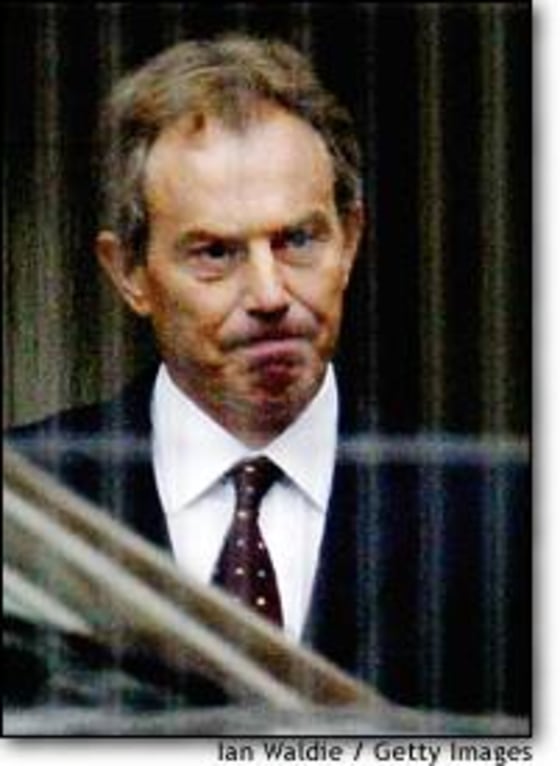British Prime Minister Tony Blair, defending his government against charges that it exaggerated the threat of Saddam Hussein, said Thursday that manipulating intelligence used to bolster support for the war to oust the Iraqi dictator “would have merited my resignation.”
Blair appeared Thursday at a judicial inquiry into the death of David Kelly, Britain’s leading expert on Iraq’s weapons of mass destruction. Kelly’s apparent suicide last month has ensnared the government in a damaging row with the British Broadcasting Corp.
The BBC aired a report in late May citing an unnamed source saying the prime minister’s office had embellished British intelligence on Saddam in order to influence public opinion ahead of the war. Later, the Ministry of Defense named Kelly, a civil servant adviser at the ministry, as the anonymous source in the report.
For nearly 2½ hours on Thursday, a lawyer for the inquiry led Blair through dozens of secret documents, seeking to determine how the government came to make Kelly’s name public, a move the scientist’s family blames for his death.
Blair, only the second prime minister in history to appear before a judicial inquiry, defended the government. “We handled this by the book,” he said.
The inquiry, led by Lord Brian Hutton, has been gathering witness statements for a report on Kelly’s death, expected in October.
Blair’s long-awaited testimony came as public trust in the prime minister is plummeting. Blair called the BBC’s allegation “extraordinary” and “wrong,” repeating denials issued by 10 Downing Street, the prime minister’s office.
War with Saddam
The Hutton Inquiry was ordered by Blair in the days following Kelly’s death.
Since then, the investigation, while tightly focused on Kelly, has evolved into a public examination of Britain’s decision to go to war with Saddam.
And by making public thousands of pages of documents, many of them normally secret government communications over the last year, the Hutton Inquiry has opened a window on the inner workings of Blair’s government as it struggled with the decision to go to war.
Documents put to Blair on Thursday showed some senior members of Britain’s intelligence community had expressed their concern over how information on Iraq’s weapons programs was framed for an intelligence report released to a skeptical Parliament and public.
An internal e-mail from Britain’s deputy chief of defense intelligence, whose name was redacted, said “he was so concerned about the manner in which intelligence assessments for which I had some responsibility were being presented in the dossier that I was moved to write.” Blair said he was not made aware of intelligence officials’ concerns.
Relaxed Blair
The prime minister, who appeared relaxed during his testimony, said Downing Street decided to make public some of Britain’s top intelligence on Saddam in the fall of last year.
Blair maintained that, while he was in favor of a U.N. resolution authorizing any military action in Iraq, “we really had to disclose what we knew” about Saddam’s weapons programs. If there were to be a decision to go to war, “people would not unnaturally say, ‘Produce the intelligence,’” Blair said.
The intelligence produced was provided by Britain’s powerful Joint Intelligence Committee and not “sexed up” by Downing Street, as alleged in the BBC report, Blair said.
“The allegation being true would have merited my resignation,” he said. The prime minister described the BBC report as an “attack that went to the heart of not just the office of the prime minister, but also the way your intelligence services operated. It went in a sense to the credibility, I felt, of the country, never mind the prime minister. It was a very serious charge.”
During Blair’s testimony, Hutton interrupted the prime minister for clarification and to ask Blair what he knew about communication between the Ministry of Defense and Downing Street.
Hutton, a well-regarded senior judge, has no powers to force individuals to testify or to turn over evidence. No criminal charges can be brought as a result of the hearing. The cooperation of Blair and his senior advisers, which includes making public their personal e-mails and memos, is seen as Downing Street’s effort to deflect criticism that it is withholding information.
Naming Kelly
Blair defended the government’s decision to name Kelly. In testimony on Wednesday, Defense Secretary Geoff Hoon said that much of the management of the scandal was handled by Downing Street’s press office.
Blair largely confirmed Hoon’s words and said that naming Kelly, who had confessed to his superiors that he spoke to the BBC, was necessary to dispel the report. Downing Street owed it to the public not to give out “wrong information” or withhold the disclosure of Kelly’s name, Blair said.
Blair said he and his advisers spoke at length about the implications of naming Kelly and then referred the matter back to the Ministry of Defense to handle as a personnel matter. “There was nothing in the discussion we had that would have alerted us to him being anything other than someone, you know, of a certain robustness who was used to dealing with the interchange between politics and the media.”
In July, two days after a tough grilling by a Parliamentary committee investigating the BBC’s allegations, Kelly’s body was found in a field near his house with his wrist slashed. Kelly’s wife and daughter are expected to appear before the Hutton Inquiry in the coming weeks.
MSNBC.com’s Preston Mendenhall is based in London.
